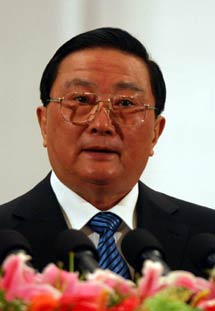Backing for citizens' rights to sue officials
By Xie Chuanjiao (China Daily)Updated: 2007-03-28 07:17
 Luo Gan. [Newsphoto/file]  |
The whole system to facilitate citizens' legal actions against officials and government offices is known in China as the administrative trial system, based on the nation's Administrative Procedure Law, enacted in 1990.
China will become more effective in preventing local officials' influence on the administrative trials, Luo Gan, a member of the Political Bureau Standing Committee of the Central Committee of Communist Party of China, told a high level legal conference yesterday in Beijing.
He also said the central government would ensure courts wielded greater independent trial power to overcome any protectionist attempts by regional and industrial bureaucracies.
Addressing the same conference, Hua Jianmin, secretary- general of the State Council, the Chinese cabinet, required all chief officials of government agencies to be present in court whenever their agencies were accused in administrative trials, rather than sending representatives.
Hua also pledged measures to facilitate administrative reconsideration and receive public supervisions.
Figures from the Supreme People's Court show from 2000 to 2006, Chinese courts handled nearly 639,736 administrative trials. In addition, in 34,581 cases, administrative compensation was awarded to citizen victims.
However, as the Political Bureau Standing Committee official pointed out, new strains in social relations were unavoidable in a rapidly developing country like China.
Citizens have increasingly been taking legal action against officials and government agencies, especially in the areas of urban and rural land acquisition and relocation programs, rural levies, corporate restructuring, labor relations and social security issues, protection of natural resources and environment, justice officials said.
Citizens were first able to sue officials from 1982, under the country's provisional civil procedural law.
The Administrative Procedure Law was enacted in April 1989 and took effect in October 1990, allowing citizens to more effectively legally challenge officials and government agencies for violations of their rights and interests.
This was followed by China's Law on State Compensation in 1994, defining the government's compensation terms to citizens; its Law on Administrative Punishment in 1996, defining punishment on officials or government offices for violations of citizens' rights and interests; and Administrative Reconsideration Law in 1999, defining terms for overturning incorrect administrative decisions.
|
||
|
||
|
|